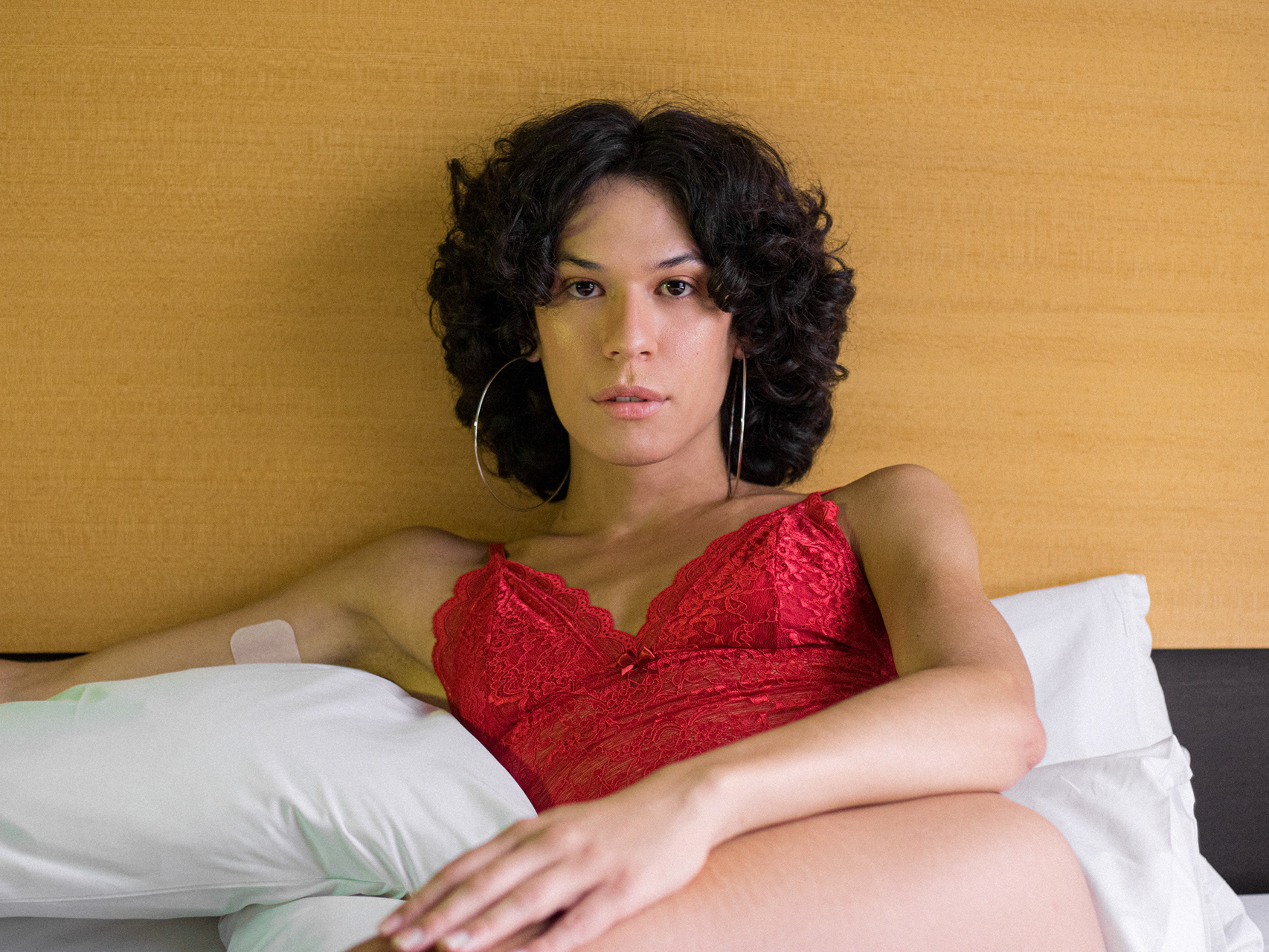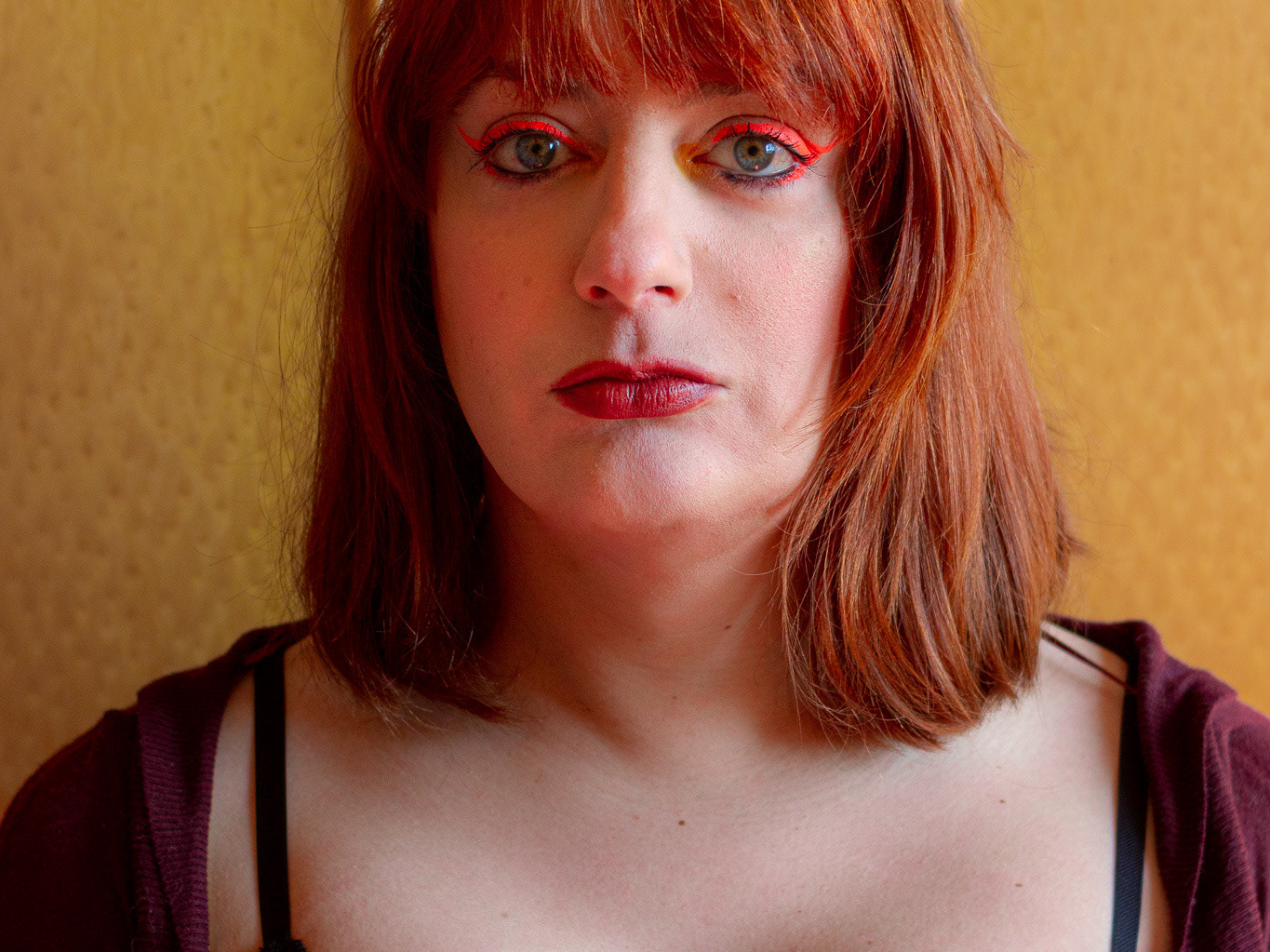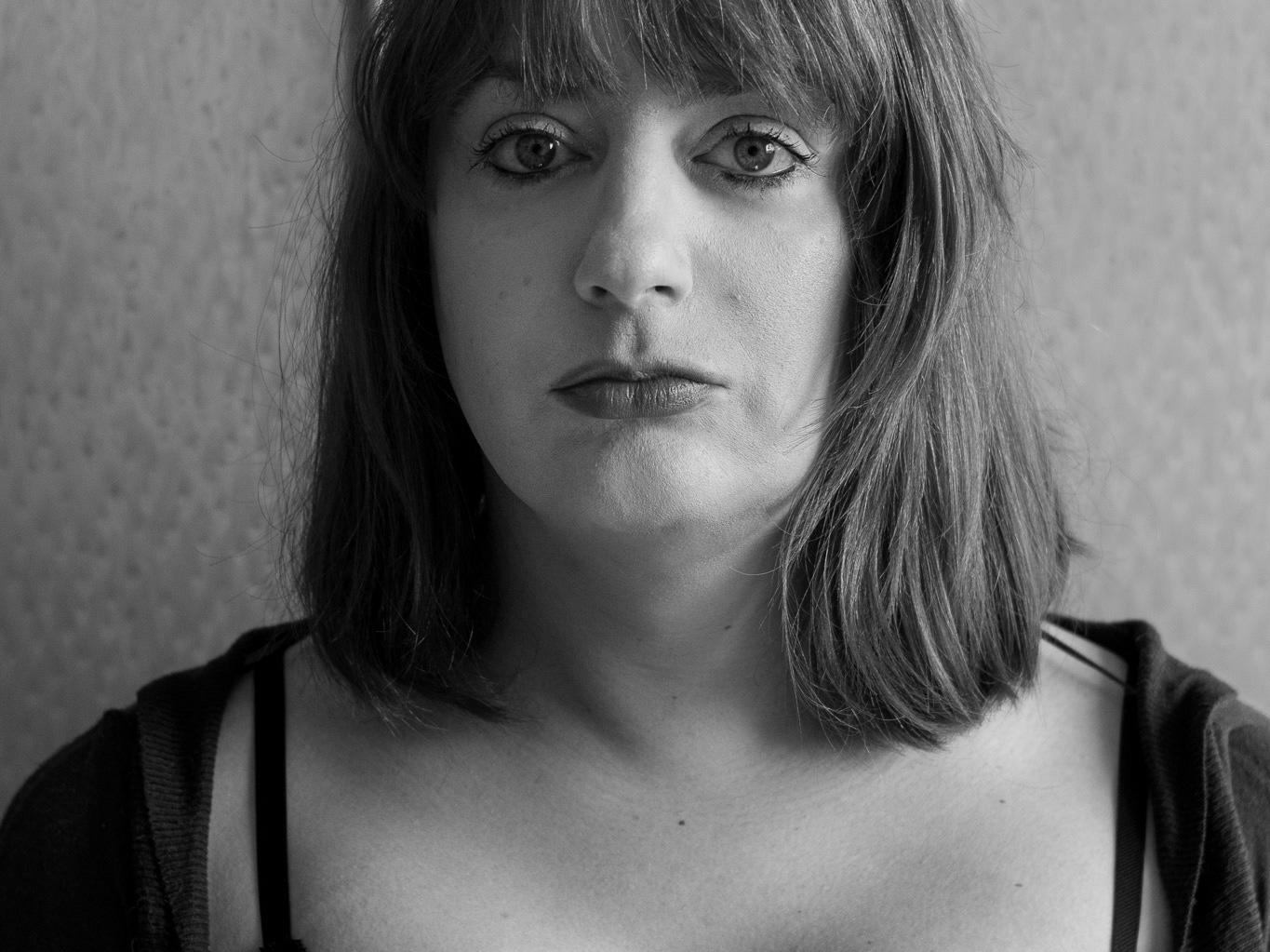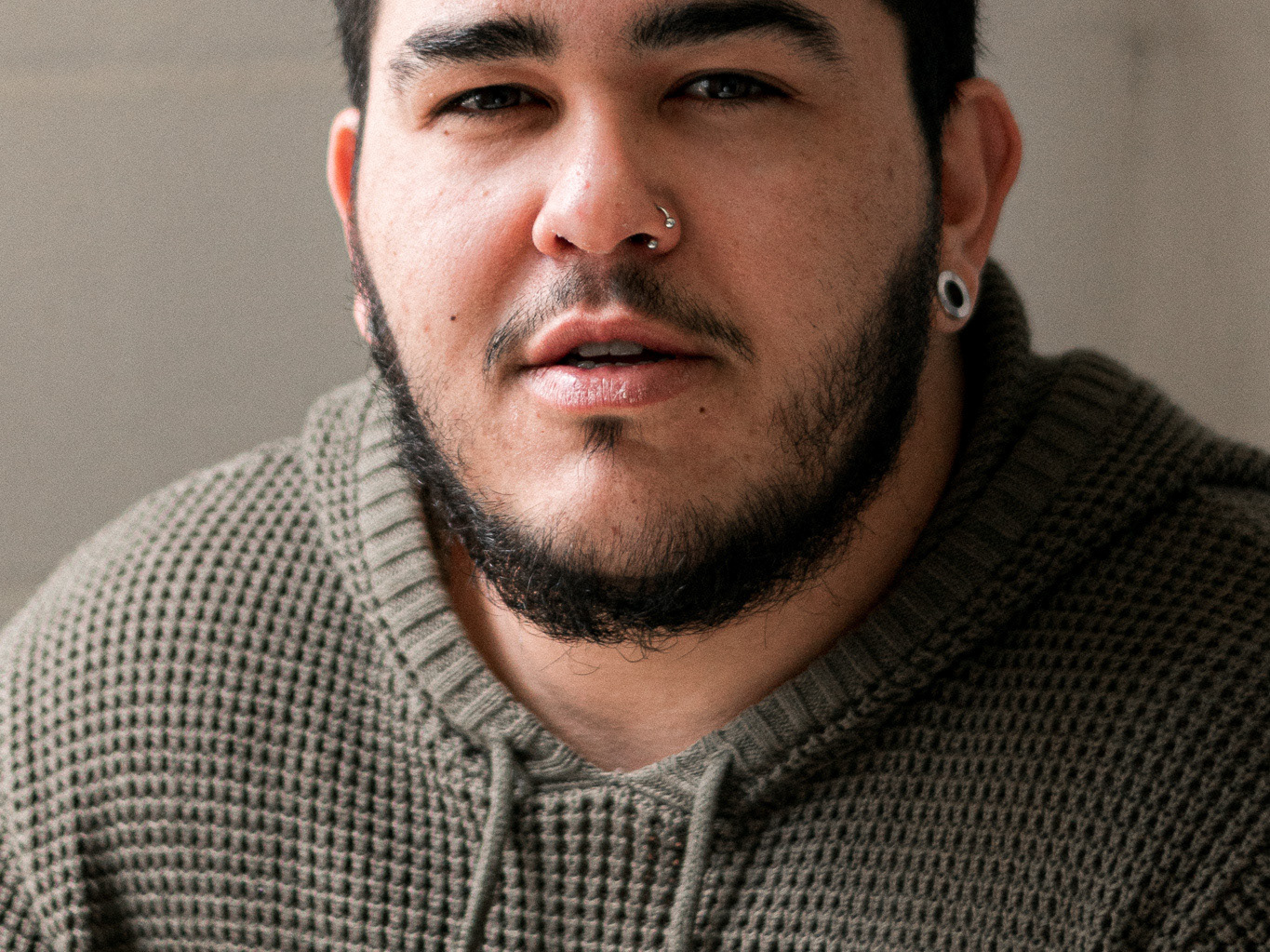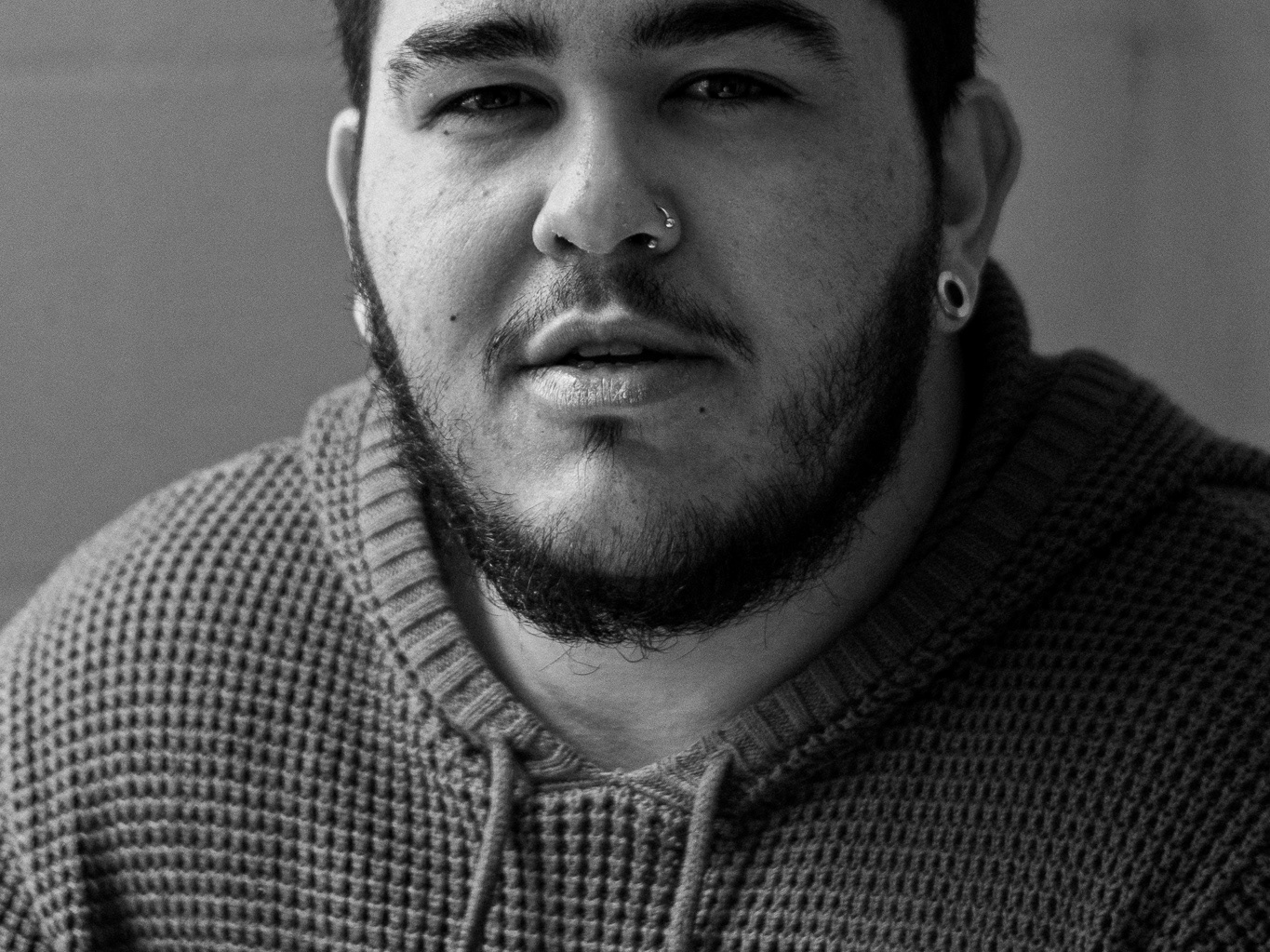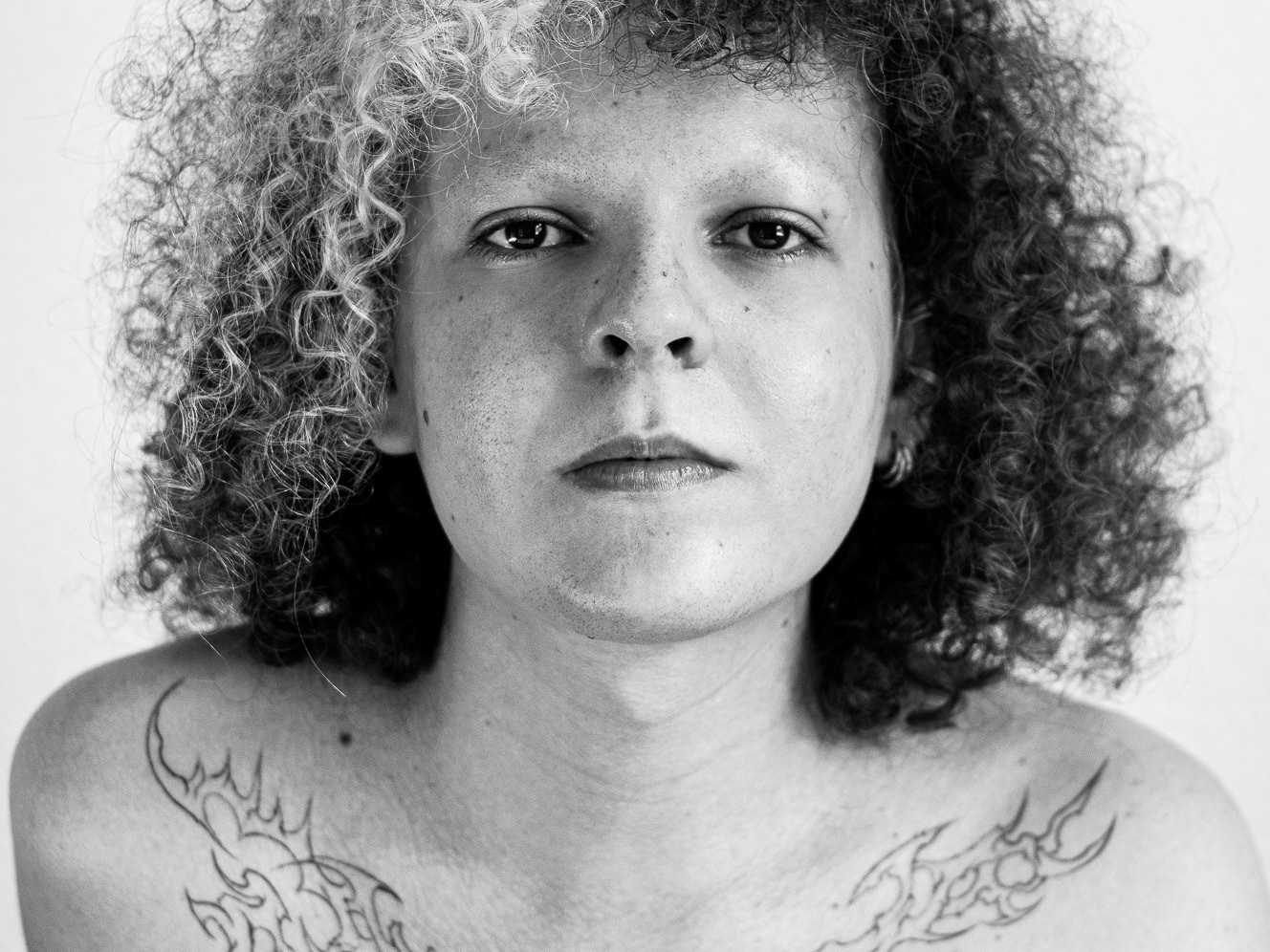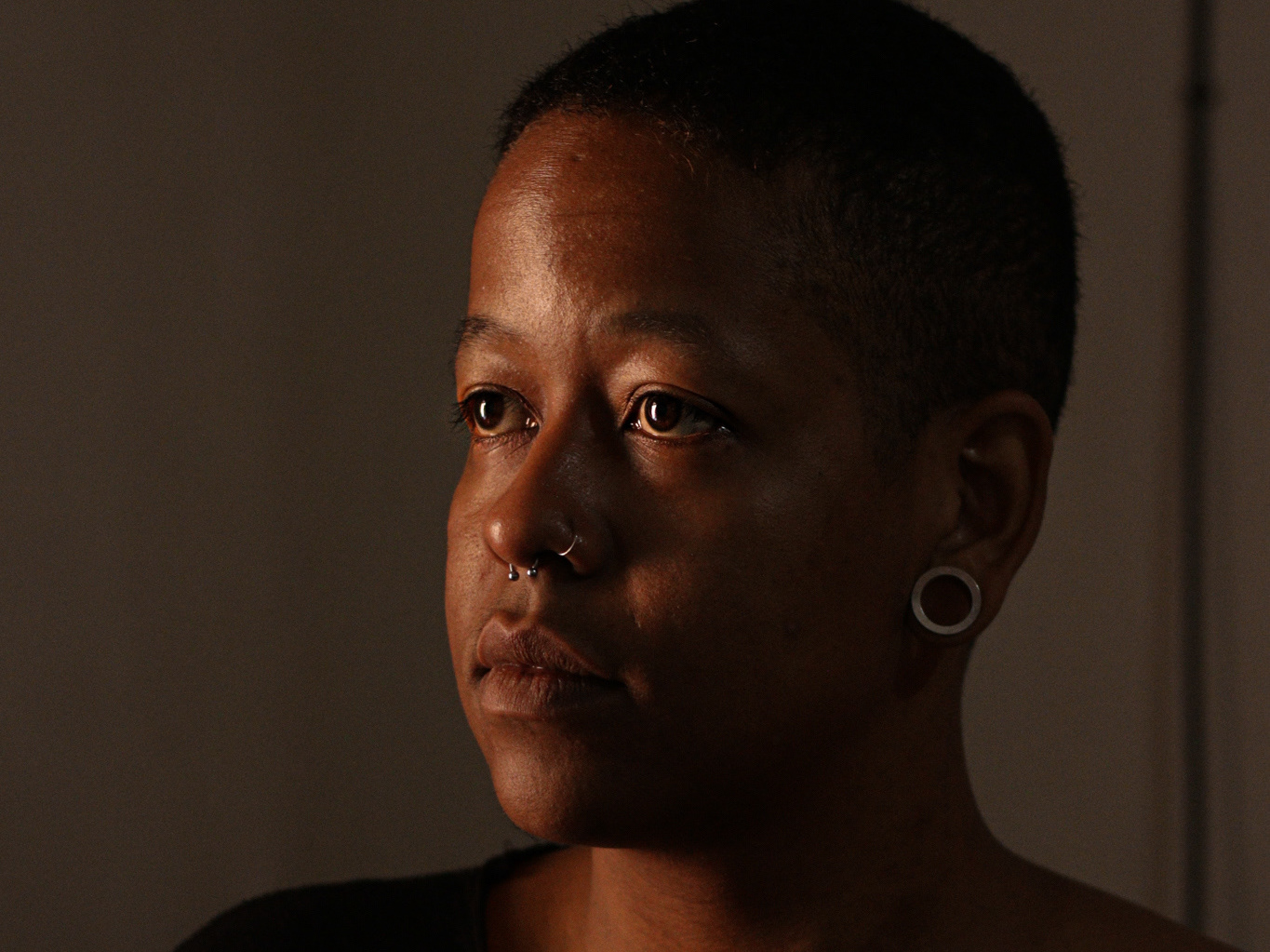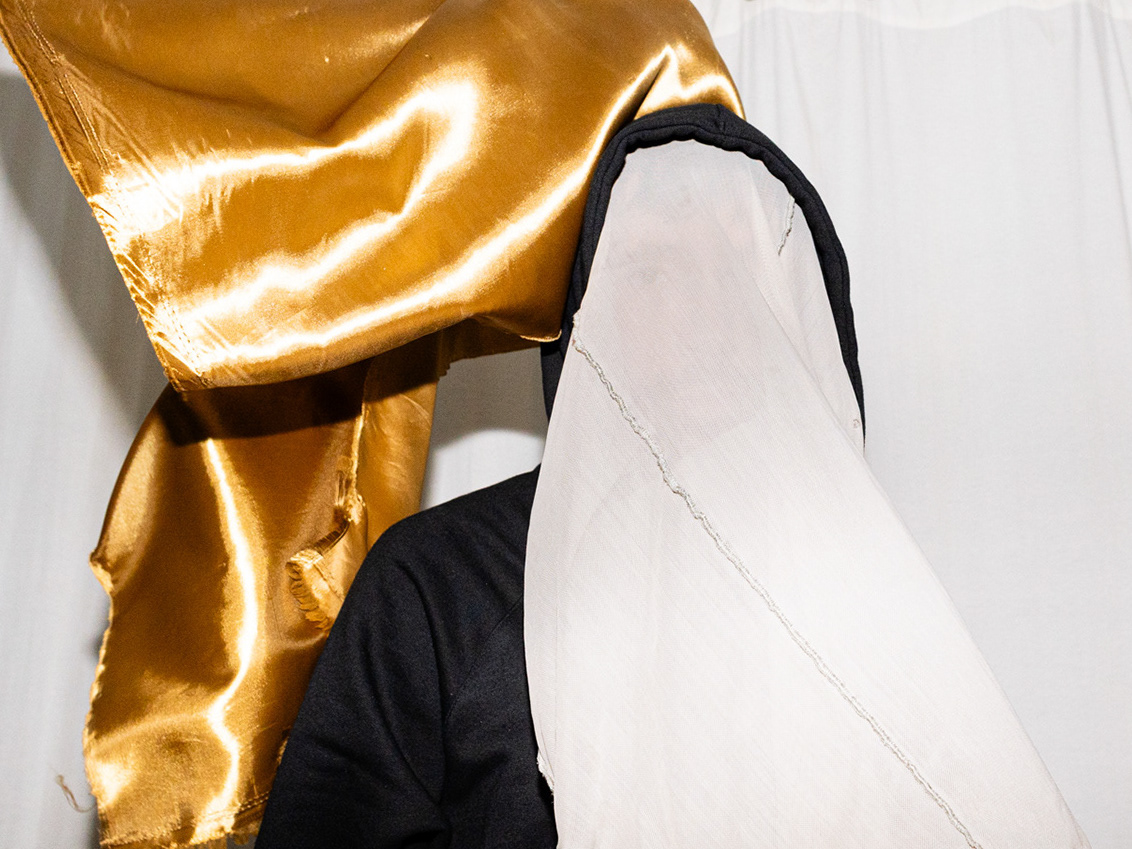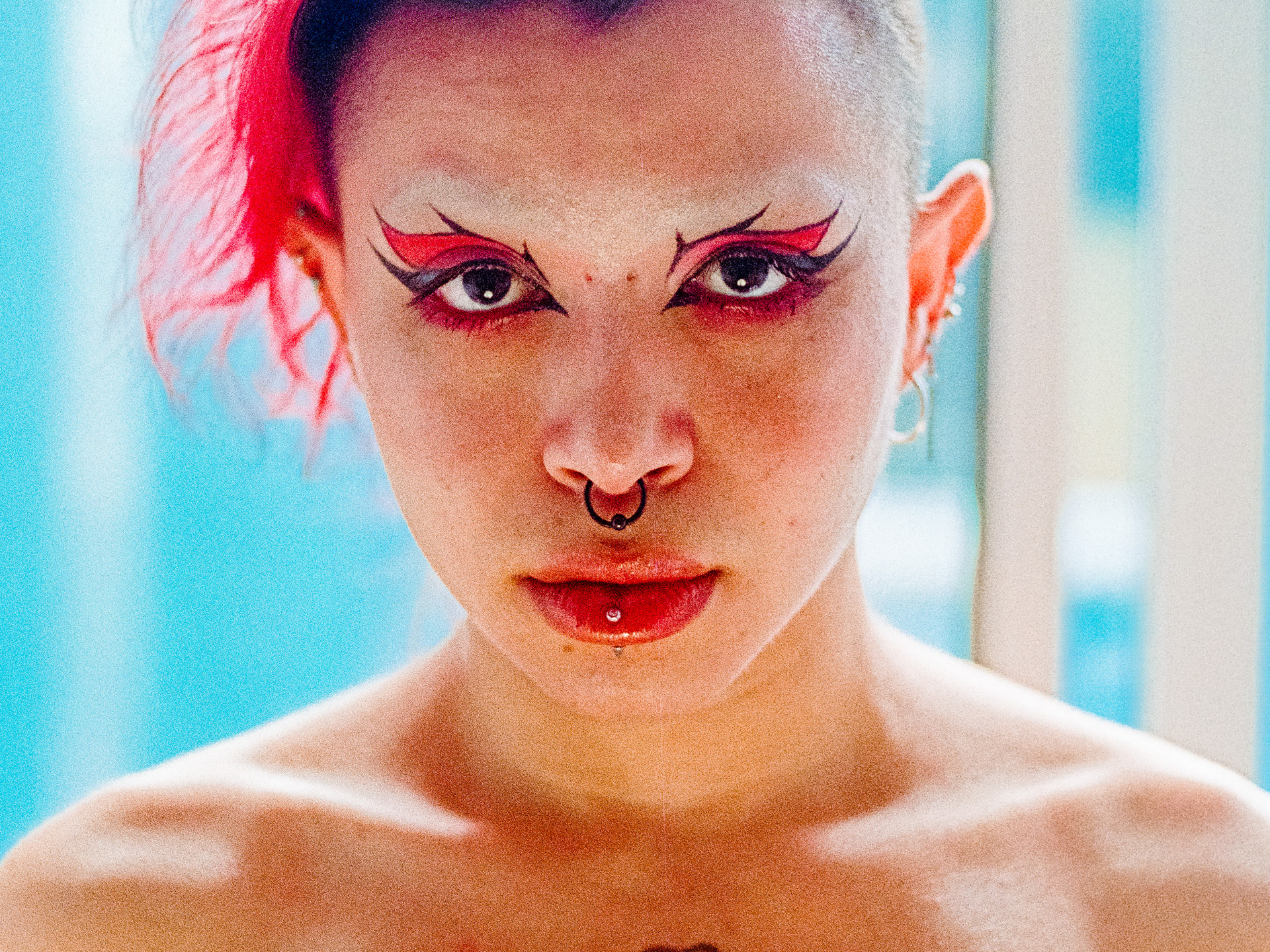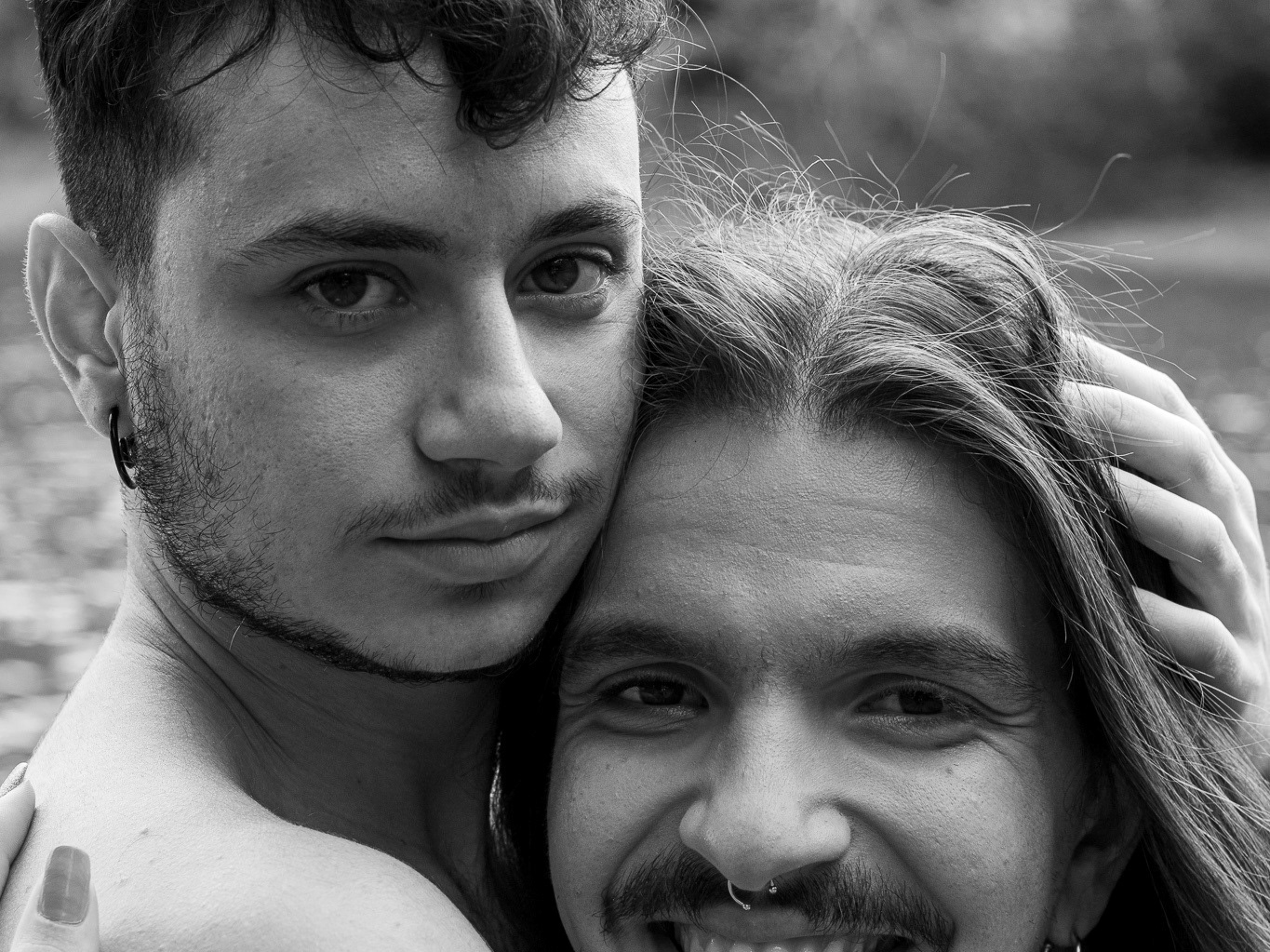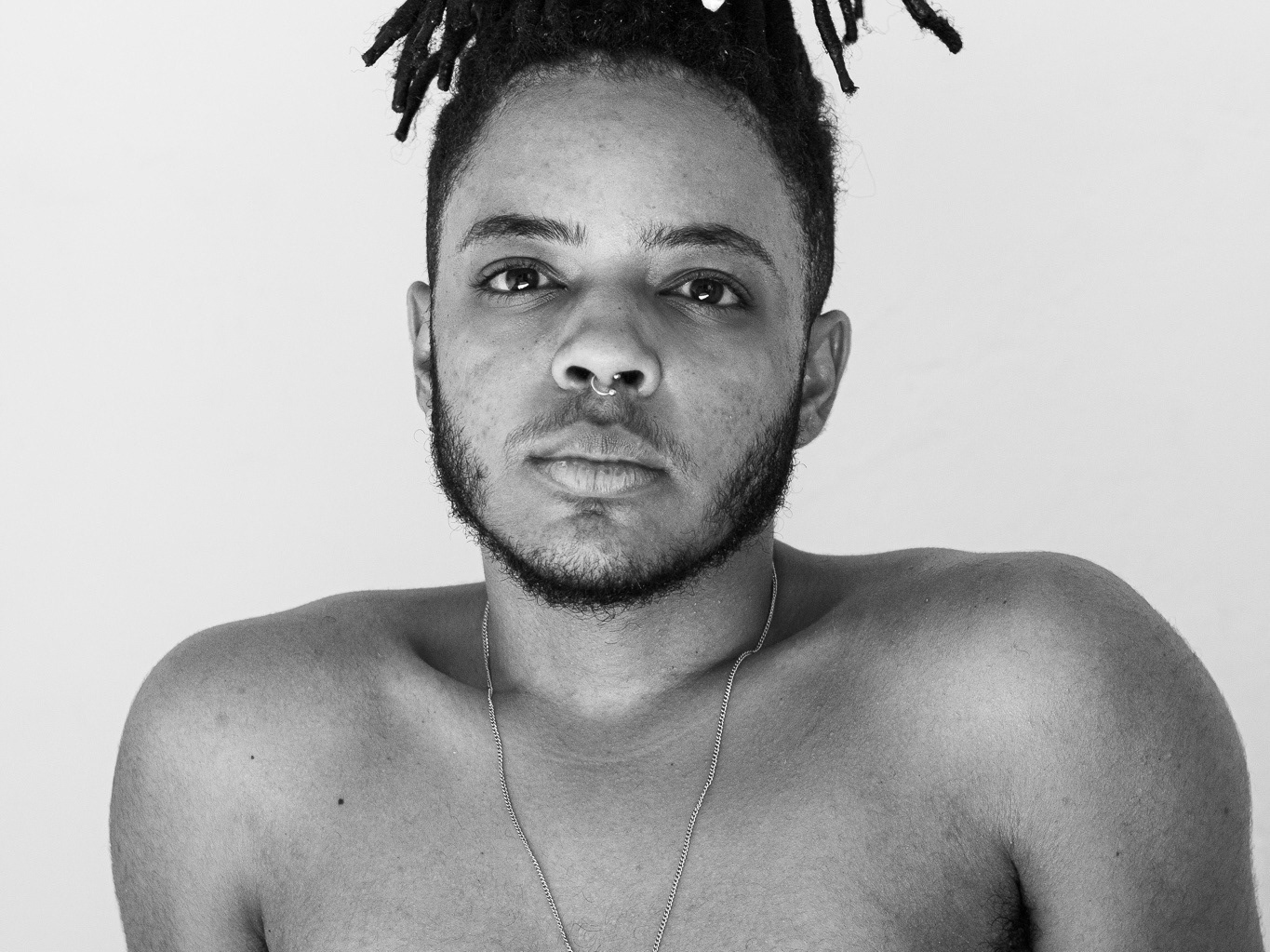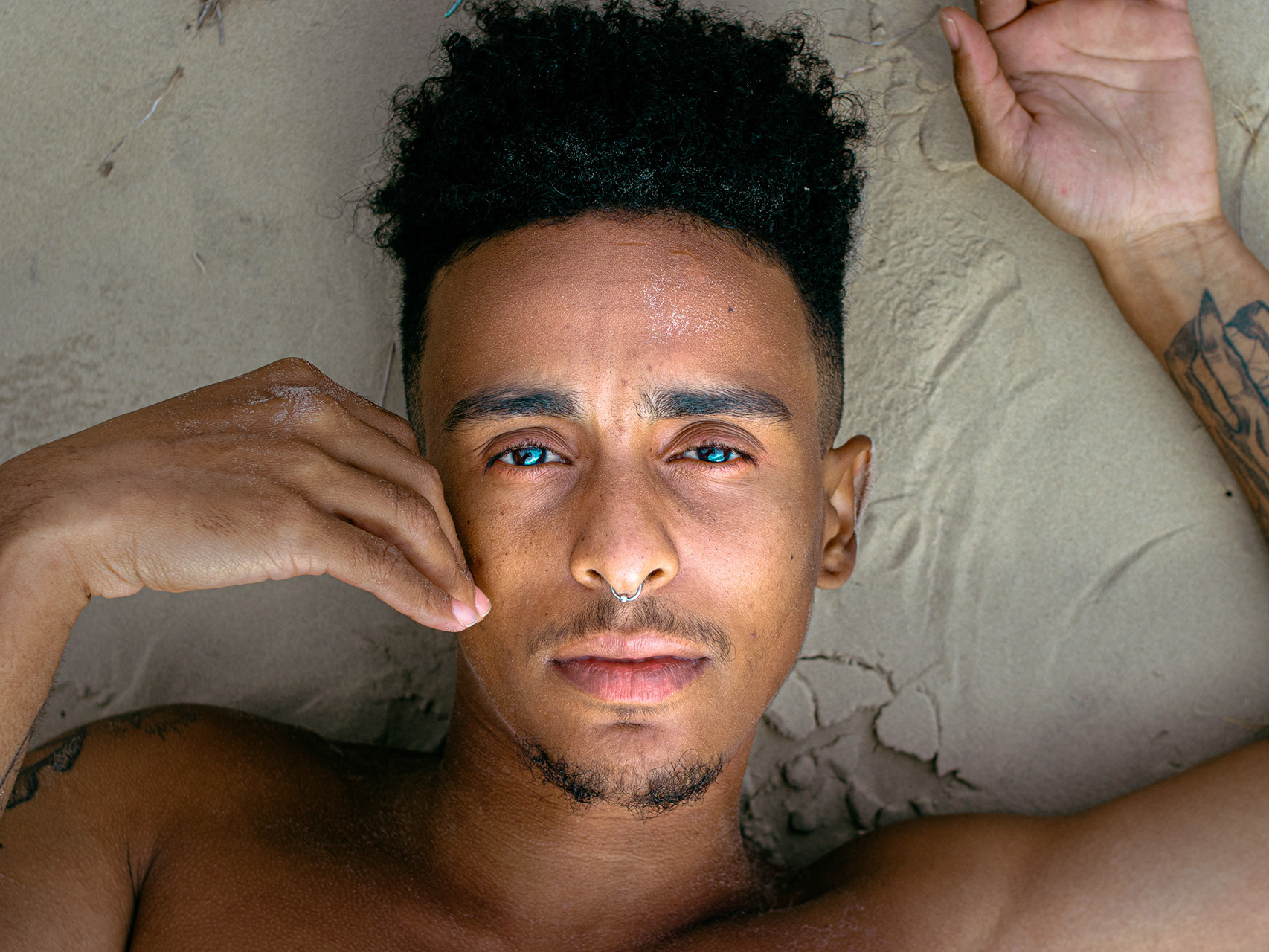[Fotografia Analógica - Revelada e digitalizada por Lab:Lab]
I'm Duda, a non-binary person, a faggot - I like to identify myself this way. Actually, when I introduce myself to people, especially at an event or something, I like to say "I'm a fag", and then there's a little bit of this journey of how I started thinking "I'm a faggot and I don't know what this means, it could mean I'm a cis gay man or something else". Over time I realized "I think it's the something else..." and that's how I understood myself as a non-binary person, a non-binary trans person. But still thinking "no, I'm a fag". Remembering the history of the word, right? At one point, everyone was a "faggot"; the travestis, the gays, everyone in the community was "faggots", I think I see myself a little bit in that. Because of my identity, at the moment I think I can be... I can go through all these fag symbols. What else? I am a psychologist. Even on my professional instagram I put "faggot, not binary and almost always psychologist". Because it's my profession, it's what I study, it's what I love to do, but it's not all about me... I think that's it about me.
I see Porto Alegre as a big city with the looks of a small town, with more neighborhoods, a community atmosphere - that's what I felt growing up [here]. I grew up and lived in an apartment about the size of this one. A one room apartment, kitchen, living room and bathroom. I was the sixth of seven children, so at a given time there were nine people living in that apartment. It was a tetris game, at bedtime trying to fit the mattresses so everyone could sleep. But we lived well. It's strange, another relationship... Leaving home, living alone, independently, me and Jeferson, than living with my family; I think it completely changed the relationship I had until then, living there with my mother, with everyone. Little by little, each one [of the children] left for their own apartments, but, in reality, most of them live in the same area as our mother. I was the person who went to live further away, in the city Center. Maybe that says something about the relationship [with my mother], I needed to distance myself a little bit to be able to get back. I think there's a lot of that when you grow up: being able to get away knowing you can come back. Having this space is important. Today I don't fight with my mother anymore, because I don't see her every day (laughs), so it's not when we'll see each other that we'll start fighting.
When I put myself publicly - I don't like the word "coming out" - when I put myself publicly as a non-binary person, she gets my name wrong, but sometimes she tries to correct herself, she's doing it her way, old lady... Not an old lady, she's 59, she turned 59 this year. Wow, she's older now, right? She's almost 60 now, but she's always been a bit of an "old lady" since my father passed away, when I was 7 to 8 years old, then she became "the widow". She aged about 20 years, after that she was more of an old lady. So it's an old lady trying to deal with these issues, and well, she's trying. There's this thing... We didn't get along, no. Since I talked about being gay, when I was 15, the treatment changed, it was more like... Until then, out of seven kids, there were two women and the rest were men. I knew she treated the two girls differently. My older sister, who is 10 years older than me, and my younger sister, who is 6 years younger than me. I had already seen it, I already knew that she kind of treated them differently; and since I talked about being gay, when I was 15 years old, she started to treat me more like she treated the girls: bad! (laughs) Because of that, because of how she understood that these roles were different - I don't know if she's aware of that, that she treated me differently, closer to how it was with Claudia [older sister], but there was this difference. Anyway, I think that as we grow, we understand that people are more complex; that our parents are human beings, just like us. That our family also makes mistakes, like us, they also have their own processes to grow and I think that understanding this was very important for me to be able to have another relationship with her, otherwise I wouldn't have. I also needed to change and review a lot of things about myself in order to understand and have a connection with her. It's not just about her understanding me and being one-sided - it's not just that she needed to change for me, I also needed to change, I also needed to grow, mature, understand a lot of things I didn't understand. I think if I didn't understand, I turned into anger towards her, then now it's a different feeling. Like I said, I think I needed my own path so to separate myself a little, to detach myself and be more on my lonely journey, to be able to return, to be able to be more connected now. I would say that, now, living in a more distant neighborhood, I am more connected with my family than when I used to live there. I think that being together made this process of change difficult, because I saw myself as the person who only suffered - and it's not as if I wasn't suffering, but to make it more complex, to understand better, to understand that all sides can suffer, and I think being there I could only see myself being attacked all the time. Having the chance to not see me being attacked all the time, and understanding the story of what my family is like is very different, because when I put it in perspective... I was 7 years old when my father died, my younger sister had just turned 3 years old, then he [father] died and she [mother] was left alone with seven children to take care of. Of course, there were my older brothers who were already working and they helped her a lot, but I think it took a lot of strength from her... She's a little crazy, but I think it's justifiable (laughs).
[Film photography - developed and scanned by Lab:Lab]
These days I was thinking about where the name Duda came from, and it was in 2016, when I started working in a bank and there was an "Eduardo" working there, they called him "Dudu", and until then, my nickname at home was Dudu, then "oh, but we can't call both the same thing", they said "it could be another nickname", they thought "it's Duda". I think it was linked to some gender or sexuality issue, but I liked it. That's how I started to be called Duda at work: to separate who was who, who was being called. Then I brought it to my life, I started using it, "I'm Duda, you can call me Duda". I realized that "Duda" can be either used as he or she, and I liked it, it stayed with me. So I would say that this possibility started to build at that moment. I think I already understand it at some degree somewhere, it was kind of latent, and when I started to understand the possibility of being a non-binary person - because there's that, right? Sometimes it's not in our repertoire and that's why it doesn't manifest itself, it doesn't come. What you don't know exists won't arise, it won't just happen. If it's not a palpable possibility, even symbolically, it won't happen. Then the word, the understanding, came to me and I thought "oh, maybe there's something out there" and I kept thinking, having my inner journey. The moment I hit the hammer, I started feeling better. I started to review these symbols and it's difficult to give a name to an identity or to who we are... This moment is complicated. But earlier this year I looked for the trans outpatient facility and after I had my first appointment there I thought "okay, that's it, this is the path I'm going to follow. There's no reason for me not to show it", then I published it on my instagram, it was in the beginning of August, I prepared a lot of stuff: video and content, stuff like that - I also wanted to talk more about myself and the things I like to talk about. That's when I published it, it's very recent; when I think "very recent", at the same time I think "no, but there's a whole other path that is much longer", it's not "oh, I woke up one day and...". Even so, waking up one day "oh! I'm trans. Ok then, I'll go on with my life...", no. It's a process, like... It's a path that has been going on since... Like a little plant growing, there's a little seed that has been growing little by little.
Studying psychology changed me a lot because when I was in high school I was a loner. I didn't say much, I was much more introverted than I am now and then I think there was a path. After I finished high school I worked as a cashier at Zaffari, so I had to talk to people everyday and I started to get used to it. Then I went to college and started working in a call center and I spent all day talking to people and it's even my profession now - I spend all day talking to people. I think that's how I managed to open myself up a lot more. When we talk and communicate we are always showing something about ourselves, even if we are not talking about ourselves. To show and act out, we are the ones who build that too, right? We're not born "something", we act in the world and create these possibilities when we do something about it, whether it's reflecting, going out on the street, or putting on nail polish and seeing how you feel about it in the practice. So, I would say it's a mixture: the things I did with what I could understand through the psychology course was what offered me some repertoire, some possibilities to rethink who I am, to put myself in question. I think for me it was a lot about this: to put myself in question. The classic: "who am I?", or thinking of all certainties and turning them into doubt; "but is that really it?", it may be comfortable, but why? I think that helped me a lot, but there's a lot about what I was able to do and not just what I was able to think about, you know? Like, using certain symbols of femininity allowed me to experience some things I had never experienced before.
There are some examples, like... Even when working, talking on the phone, always, since I was a child, people called me lady, sometimes I didn't even correct them, sometimes they thought it was my mother on the phone, I used to say " oh, no, it's me" when I answered the phone. Or, I don't know, when I called the telephone company I would say "this is Mrs. Sônia [mother]". When I was working at the bank I couldn't use nail polish but I had long nails and once a client started making comments about my nails. I felt very uncomfortable, but, ok, I helped him at the ATM, which was one of my tasks, and left. Then, another day, there was a child and her grandma, then the child looked me up and down, looked at my nails and said "why do you have long nails?", I said "I like it, I like how it looks on me", "oh, but it's for girls", I said "okay, ok then" (laughs). The child continued, she was restless, she looked at my hair "is it a wig?", and the old woman, her grandmother, who I was helping at the ATM, was already uncomfortable. Then I said "no, no, it's really my hair", she turned to her grandmother and said "oh no, because my grandmother wears a wig" (laughs). The old woman "stop talking like that, don't talk!", "but it's true, you wear a wig, grandma!". I burst out laughing, I tried not to, but I blushed and laughed, and then "no, okay. That was it."
I find interaction with children very interesting, because several times there have been children who looked me from head to toe and asked "are you a boy or are you a girl?" Mothers are always like "don't ask, don't tell people that" I think it's always better to ask. I cannot see a child with malice, but with genuine doubt; because they had always been taught certain symbols, a certain rigidity, they are in doubt. There was this time a mother, a child in the stroller and a boy - I think he must have been 8 or 9 years old - entered the elevator I was in. [The boy] kept looking at me from head to toe, I had my nails done, my hair was tied up, we were already in the pandemic, so I was wearing a mask, and he asked me "are you a boy or are you a girl?" I looked at him and I said "what do you think I am?", he said "I think you're a boy", I said "okay". I didn't answer him because I don't think it's a question that needs to be answered. He can see me in any way he wants to see me. I was even talking to a patient these days - I think it's important for me to say and repeat these things, because sometimes I'm talking to someone what I also need to hear - that what he thinks about me, it's not me, it's not part of me, it's what he's seeing with the connections he's making, with the understandings he has and that's it; he thought I was a boy, so okay.
I think a lot of people would be very offended by the question [of being a boy or a girl], I don't feel [offended] because I try to understand that the person may have genuine doubt, but I have no responsibility for them. People may have questions about me. I have no doubts about who I am, I have no doubts about how I place myself in the world, but people can look at me and be in doubt, okay, and that's it, you can find whatever you want, it's not about me. Or rather, it's something about me, but from someone else's eyes, so it's not mine, it's not me, it's not part of who I am. The person can look at me with doubts or not, I don't know, fuck it.
These times, too... I love this thing of when the person gets confused or says something and doesn't know, I think it's very funny: "how do I refer to you?". People always ask me, they say "oh, he... Oh, sorry, she! I'm still getting used to it", I say "ok, get used to it as you want, actually. Say whatever pronoun you want, keep trying." In my preference list, if I could put it in a preference list I would say: feminine pronouns, neuter pronouns and masculine pronouns. In that order. I also think that many times [masculine pronouns] can be used as a reinforcement of "no, you were born in this body, so I'll always use masculine pronouns", not that it's a big problem, it's the person who is choosing to position themselves that way. If I realize it's malicious, then there might be some discomfort, but if I don't see it as malicious, like, on purpose, to hurt me, then it doesn't affect me much. Anyway, I'm not very attached to it because I'm a person beyond what my profession is, what my gender is, or any other characteristic about me; it's just a cutout, just a part of me. I keep thinking because I call everyone "girlfriend", but sometimes gender flexion won't be right, but then the person will correct me, tell me something…
Oh, these days a man at the bank line said "the lady here arrived before", I was like "hey, he said lady, I'm passable. It means today I came out beautiful!" (laughs) It's funny because it took me by surprise that he saw me like this - ok, half of my face was covered but... It's interesting that in certain places things are different. I think there's a lot to do with where we are located territorially, I think that in other places it would be more difficult. I think that because of so much pressure that we are under, we end up having to make these movements to have rigidity, to create a barrier. From "no, you won't do this to me", etc., because we receive so many different offenses…
I think I'm lucky to be able to go slowly with this, but also, well, I was working with schools - I still am - when I published [about being nb], I talked to people about my name and two of the schools that I was working at stopped scheduling sessions with me. First I changed my name in the system, an online platform, then I talked about it and shortly after these two schools stopped scheduling, but the other school started to schedule more. These are public schools in the state of São Paulo, it's a partnership with the company I'm working with. Then other schools came and they came by indication of this other school that started to schedule more. I think these were interesting moves. One can surely give the benefit of the doubt, saying that there were other issues that made these schools ask for my disengagement as a professional. It could have been other things, but it's a huge coincidence, in the same week! It wasn't very good timing, but anyway, it's part of the game. I keep going, I keep trying, I do my path. I think it says a lot… We, who have to disclose ourselves... I get a sick feeling in my stomach thinking "this is going to be the first information people will see about me and it will be very present in my practice", it makes me afraid of failing. Everyone likes to give likes on Instagram, commenting "awesome! Breaking taboos!", but no one wants to hire, pay for the service, pay our bills, hire our work. There are a lot of people who applaud, but to actually make a difference... Does applause help with self-esteem? For sure. It helps, right? But it doesn't pay our bills. So I think I took advantage of this timing of putting it publicly to spread myself more, posting more content - which nowadays is what we have to do to have a job -, so a lot of other trans people and LGBT people in general came to look for me. It was an interesting move. There is a risk of being stuck into the niche, of being "I'm a LGBT professional", which is not something I want to be, it's not something that suits me as a professional, but I understand that's how people feel more comfortable with, looking for someone else who has a similar, or who you assume has a similar life story. Especially when it comes to psychotherapy - which is talking about yourself, opening up about these issues - and to feel comfortable that [prejudice] won't happen. It was hard to put me like this, but that's it, I'll get by; these are frightening movements, they give you a sick feeling in the stomach, but they are worthwhile, both for us as individuals, and in terms of creating a community. Not in the sense of "The LGBT community" because I don't think that exists. There are the communities we create, the connections we make with the people we're in contact with. And that's what I think is very important, creating these bonds. One of the first things I did was search for non-binary people on instagram, I searched for "non-binary", "nb" and followed some profiles, and one of those profiles that I followed followed me back and they found it interesting that I was a non-binary psychology student, then they made a post to publicize non-binary psychologists and included me. After this post, many more people came looking for me too. But it's that thing, from ten people who come looking for me, one is actually going to hire my service, but several people came because of this post, they still come - to give you an idea of the shortage of professionals there is, but you know, in an ideal world, any professional would be prepared to deal with these issues, and not only a LGBT professional, as well as a LGBT professional can also be a jerk. But I think it makes a difference for people to be able to see that and I'm happy to be recognized through that part of me.
I remember an argument of one of my uncles with my older sister, Claudia. I don't know what they were arguing about, it was Christmas - you know, those Christmas family discussions which are not angry arguments, but because everyone was drunk it was a discussion. My sister told my uncle "you're not humble" or something like that and then he said "I'm not humble anyway! Why am I going to be humble?" Am I going to let people shit on my head? Am I going to be bowing to something? No! I'm not humble, no. I do my stuff, I pay my bills, I travel. I'm not going to bend my head to people like that. I'm not humble, no. Humility doesn't serve me.
I found it interesting, because we talk a lot about pride in June [LGBT pride month] when we're talking about gender and sexuality. I understand that it's because we are so rejected for being who we are, and then we really need to say it out loud and be proud to be part of this community. When I think for myself, pride... is me being proud of who I am, not just for being trans or when I understood myself as gay or whatever, it's being proud of the many choices I've made in my life that are not necessarily about gender or sexuality. Being proud of my history, of the mistakes I made and could learn, being proud of having vomited in the street drunk at four in the morning and then being able to learn that I have an alcohol issue and I have to regulate myself, the pandemic came and forced me since I didn't have more opportunities to drink. But, anyway, being proud of growing up, of being able to be better... I don't know, thinking about it now, I think pride is looking at myself today and knowing that I'm better than I was yesterday, that's pride. It's me realizing that I'm on a path to improve myself and trying to be the best I can be today; which is worse than I will be tomorrow. I think that's it, because it's not about a specific feature. I can forget about everything that I am, things that I am and that I am not, and that go back to everything. It's not just... I don't spend all day thinking "I'm trans, I'm non-binary. I'm trans, I'm non-binary", "Hi, how are you? I'm trans and I'm non-binary", no! I'm like "okay, get me four rolls. Thanks, honey, bye", and I'm not thinking about it. I'm just there, I just want to buy my rolls. I don't want to go out and think about what gender symbols I'm wearing or not, I just want to get out wearing sweatpants and my huge sweatshirt, it doesn't give any shape for my body; as much as I like to sometimes wear clothes that give a shape to my body. I just want to buy my roll, smoke my cigarette and chill. It's not about [gender] all the time. Then, when it comes to pride, it seems that this is all we are, and it isn't! It is various other things.
It happened to me already, there was a person behind me "Lady, excuse me. Lady... Lady..." Then they tapped me on the shoulder and asked about a bus. I was like "What? huh? Oh, it's me." I was kind of daydreaming, then "oh, no. The bus passes right there". It was me (laughs)
Don't forget to wash behind your ear - this is something very important and that few people talk about, only mothers, but when it's the mother talking, you don't care. Apply sunscreen, wash your hands, apply alcohol gel and, also, it's always good to have a moisturizer because we use too much alcohol gel and forget to moisturize our hands.
I think putting ourselves into action is worth more than any reflection on ourselves. I think that when we put ourselves in new situations, we can think of new things about ourselves. Start using a new nickname that may eventually become your name, as was my case. Use symbols that you like, go out, dive right in. Like, do things without thinking about whether it necessarily makes you trans, bi or whatever. Go, get out, do what you want and see how you feel while you're doing it. There is no "we" before there is what we do. We put things into practice and then see what will happen. Like we were saying: I'm questioning myself, I'm going to question myself, question myself, question myself, until boom, now I'm taking hormones, no! We do other things and with time we will see how we are. Then we do the math, if you achieve 100 points, oh! Then you're trans! I'm kidding! (laughter). Then you calculate how you feel doing that thing, in that situation and you see. Maybe something will come up there, I don't know... It might not come up either and it might just be another cool experience you had. Doing is worth more than a thousand years of reflection. Not that you don't need to reflect, but act from another perspective. I think that's it.
[Film photography - developed and scanned by Lab:Lab]
Duda
1996
Faggot, psychologist, eternally trying discover who I am with the certainty that when I find out I won't be. I help people to find themselves but also to get lost.
1996
Faggot, psychologist, eternally trying discover who I am with the certainty that when I find out I won't be. I help people to find themselves but also to get lost.
*essay from October 2021, Porto Alegre (RS), Brazil
Project financed by the notice resulting from the Term of Consensual Commitment signed by PRDC-RS/MPF as a result of the early closing of the exhibition "Queermuseu - Cartografias da Diferença na Arte Brasileira"
-
This project was idealized and is made by Gabz, a trans non-binary multiple-language artist. Ser Trans is a project that portrays and also makes room for trans, travestis and non-binary people to be the protagonists of their own stories. We are seeking for representation in front and behind cameras. This project started out of urgency. Ser Trans is made also in collaboration with Lau Graef, transmasculine artist, visual arts student and autonomous activist; Luka Machado, travesti, actress, visual artist and activist; and Morgan Lemes, black trans man, screenwriter, researcher and photography assistant.
Ser Trans is autonomously produced by trans people and all content is offered for free. You can sustain this project by sharing it with friends and making a one time or recurrent donation - any value is welcome. For early exclusive access to all content, subscribe to the project's Patreon. To know click the link bellow. Thank you for supporting a project made by trans people <3
Autorretrato de Gabz revelado por Eloá Souto, digitalizado por Lab:Lab
